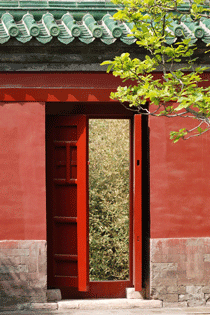By Christine LaPlaca
Last August, I had the privilege of travelling to Beijing, China, on a study abroad trip. Study abroad programs are a huge part of what is offered by a liberal arts education. In her editorial for The High School Graduate website, “The Benefits of a Liberal Arts Education,” Shilo L. Ellis defines a liberal arts education as “a broad-based education in which a student studies a variety of different subjects in order to gain a better working knowledge of the world around him or herself, rather than focusing in and specializing in one specific area. The liberal arts education prepares the student for a lifetime of opportunities and changes.” Exposure to multiple areas of study offered in a liberal arts education provides students with an overview of a wide range of topics and skills they can draw from in their everyday lives. Ellis also states that “the main benefits of a liberal arts education are that it teaches a student how to think and, in turn, how to learn.”
It is the liberal arts education and the opportunities provided at liberal arts colleges that allowed me to travel to Beijing last year. When I first set out on my trip, I was most worried about getting motion sickness on the flight. Luckily, when I boarded the plane I was fine. If only I had known what awaited me when I arrived in Beijing. I was faced with one of the most difficult tasks I had yet to experience. Nothing physically bad happened to me in China, but the emotional and mental experience is what almost broke me. I was thousands of miles from home, didn’t have any friends or acquaintances, and could barely communicate with the people.
The first night was terrible. I could barely breathe because of the humidity, the smog covering the city, and the refusal of my host family to turn on the air conditioner despite the terrible heat. I missed my family and was afraid. Each time I thought I was getting used to my new environment, something would catch me off guard, and I would yearn for home. It took me nearly two weeks to finally understand what an amazing experience I was having. When I realized how unique my trip was and what a great opportunity it was, I set out to make the most of my time.
The most valuable part of my study abroad experience was living with and interacting with the people in their own culture. While in Beijing, I lived with a host family. My family provided most of my meals, helped me with transportation, and spoke Mandarin Chinese with me. Living with a Chinese family was one of the best parts about my study abroad program.
Without a liberal arts education, I never would have been challenged physically, mentally, and emotionally. In fact, without the language requirements of a liberal arts education, I never would have realized how interested I am in China, and I never would have majored in Asian Studies.
In his Huffington Post blog “What’s a Liberal Arts Education Good For?” Michael Roth states that “the development of the capacities for critical inquiry associated with liberal learning can be enormously practical because they become resources on which to draw for continual learning, for making decisions in one’s life, and for making a difference in the world.” A textbook cannot truly teach me how Chinese people live. The best way for me to understand them and their lifestyle was to literally live with them. My experience in Beijing helped me grow as a person—I became more independent, learned to think on my feet, and learned to interact with the most unlikely of people. Studying abroad exposed me to how other people live, which is important for understanding the world and humanity.
What I learned on my trip was that no amount of classroom instruction can prepare one for what is really out there. I may learn 3,000 Chinese characters, but unless I use them with the native people, unless I experience the culture, the history, and the environment in which they were created and are used, I will not truly understand the language or the people. A liberal arts education allows for these life changing and challenging experiences. Roth agrees that “a liberal education remains a resource years after graduation because it helps us to address problems and potential in our lives with passion, commitment and a sense of possibility.” My liberal arts education has provided me with skills and opportunities that will last longer than my undergraduate career. The experiences and skills I will take away from this education and from my trip to Beijing will make me a stronger person—physically, mentally, and emotionally—and prepare me for the challenges life may bring.
Christine LaPlaca is a senior at the University of Mary Washington majoring in English and Asian Studies. The University of Mary Washington is home to the Kappa of Virginia chapter of Phi Beta Kappa.
To read the blog that Christine LaPlaca wrote in China, click HERE.
Photo: Traditional Chinese gate in the Temple of Heaven in Beijing, China.




